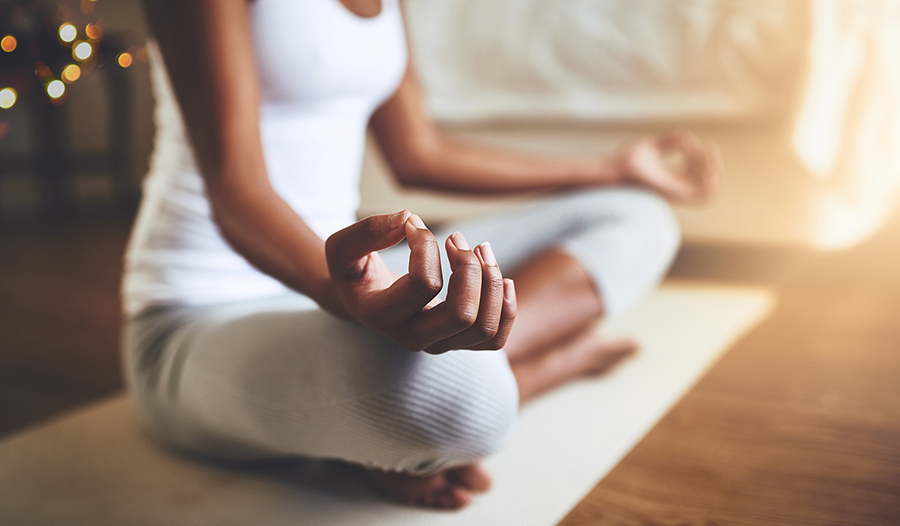11 Natural Lifestyle Tips to Support Mental Health

In decades past, mental health was something that wasn’t discussed and often not addressed until there was a serious problem. Luckily, now we live in a time where people are openly moving toward discussing their mental health in all forms, from mild stress and anxiety all the way to more serious mental disorders.
Mental health issues require a comprehensive assessment with a licensed healthcare provider, but there are steps anyone can take to change their lifestyle and improve their mental well-being. Here, we will learn some ways to optimize our diet and daily habits to improve our mental health.
1. Consume a Well-Rounded Diet Full of Fresh, Unprocessed Foods
A 2015 Korean study of 849 girls ages 12-18 found that a diet high in heavily processed fast food was associated with a higher risk of depression. Limiting consumption of fast food is important for many aspects of good health besides mental health.
Besides limiting processed foods, there are many different diet strategies when it comes to mental health, however, the evidence often conflicts. Some studies report that too many carbohydrates can contribute to depression, while others say too few carbs can have adverse mental health effects.
Many sources agree that suboptimal nutrition can contribute to many types of mental health conditions. Often diets need to be individualized, and a diet that works for you may not work for someone else. Balancing protein, carbohydrates, and good fats like nuts and seeds in healthy ratios and limiting processed food is generally helpful. Find a licensed naturopathic doctor or registered dietician to help you with an individualized diet plan that works for you.
2. Get Outside
A 2018 review of the literature looked at some of the numerous studies that have shown nature is important for positive mental health. It has been found over and over that contact with nature encourages positive emotional responses, self-esteem, and cognitive functioning.
This study was looking for specific aspects of nature that have positive effects but did not come to any definitive conclusions. Even if you live in a very urban environment, find some time to get outside and in the sun to soak up some vitamin D, every little bit helps!
“Forest bathing” is a concept in Japanese culture. Studies have shown that forest environments can help lower the stress hormone cortisol as well as adrenaline, have a calming effect on the nervous system, and reduce anxiety, depression, anger, fatigue, and confusion while increasing vigor.
3. Get Enough Sleep
Sleep is imperative to good physical and mental health, and getting enough should be a top priority as part of a healthy lifestyle. A 2017 study of 850 patients with pre-existing respiratory disease found a strong correlation between poor sleep quality and mental health issues.
Some studies have found that optimal magnesium levels are helpful in getting a good night’s sleep. Another option for troubled sleepers is melatonin — this supports the natural sleep hormone your body produces to make for a more restful night’s sleep.
Try to always get 7-8 hours of sleep per night, and if you are having difficulties see a licensed healthcare provider to see what can be done to improve your sleep.
4. Minimize Sugar Consumption
A 2017 study analyzing the diet and depressive symptoms of 4,969 people ages 18-70 found that higher sugar intake, as well as diets high in processed saturated fat, corresponded more strongly with depression than those study participants who did not consume much sugar.
Avoiding or minimizing processed sugary products in your diet may help maintain good mental health. Stevia is a natural sugar-free sweetener that can be a helpful substitute when you’re craving something sweet.
5. Keep Your Blood Sugar Stable
Some people have wide blood sugar swings throughout the day or when they go too long without eating, which can cause symptoms of anxiety and depression. This is commonly referred to as being “hangry.” It can happen even in people who are not diabetic.
Keeping a healthy snack handy and eating more frequently can help prevent these mood and energy swings as well as keep you feeling more mentally sharp.
A surprising way to help balance your blood sugar is to consume more cinnamon. Add it to your smoothies, tea or coffee to help keep you feeling balanced throughout the day. Talk to your doctor if you feel like your blood sugar crashes are interfering with your daily life.
6. Avoid Artificial Sweeteners
Aspartame, a common artificial sweetener, has been linked to symptoms of anxiety. Symptoms can resolve shortly after stopping the consumption of aspartame and return again shortly after consuming it. Removing aspartame from your diet may help manage anxiety.
It is commonly found in zero-calorie sweetened products, read labels carefully to avoid aspartame. Again, swapping artificial sweeteners for natural stevia is an easy change.
7. Find a Form Exercise You Like
Exercise is good for health in every which way, mental and physical. The key is to do exercise you enjoy and look forward to. If you are dreading exercise and dragging your way through it, it’s time to try other things! Some people like going to the gym while others need to be outside. Finding a walking buddy works great for some people, while others want to go at their own pace.
Exercise increases blood flow to the brain and encourages neurotransmitters and hormones to work properly. Many studies have found links between regular exercise and many kinds of positive mental health outcomes. Many people feel so much better when they get in the right groove of exercise that works for them that they actually look forward to doing it. The key, again, is finding the activity that is enjoyable.
8. Limit Caffeine Consumption
Excessive caffeine consumption has been shown in studies to be linked to both depression and anxiety. This may be linked to individuals who are genetically prone to slowly metabolizing caffeine, although it is also more likely to be a problem the more caffeine consumed.
Symptoms of anxiety may be indistinguishable from excess caffeine consumption, causing nervousness, heart palpitations, insomnia, and irritability. Individuals suffering from anxiety and depression may benefit from lowering their caffeine intake.
There are other things you can use to support energy levels without caffeine. Talk to your doctor about finding the cause of low energy if it interferes with your daily functioning.
9. Limit Household Clutter
A 2010 study found that cortisol, the stress hormone, was higher in those with a lot of excess clutter in their homes. Study participants gave home tours and those who used more negative words to describe their homes, such as cluttered, messy, and broken, had higher levels of cortisol in their saliva and higher levels of depression.
Decluttering has received a lot of attention recently — for good reason. Organization experts like Marie Kondo encourage people to only have things in their homes that bring joy and to get rid of things that cause stress or unhappiness.
10. Have Self-Compassion
A 2018 study in Korea found that older adults who had more self-compassion during times of stress had better mental health than those who were hard on themselves when difficult things happened. They also had better overall life satisfaction.
Self-compassion is also a type of self-care. Taking good care of yourself so that you can participate in life at your optimal functioning is of paramount importance.
11. Build a Good Social Support System
The single most important part of feeling mentally healthy is having people to rely on. Everyone needs a friend to vent to occasionally and to have people around when you need help. Humans are social and need frequent interaction, and many studies have shown this. Unfortunately, in this time of enforced social isolation, this problem is exacerbated.
A 2020 systematic review concluded that children and adolescents especially are very likely to have increased rates of depression and anxiety during enforced social isolation that is currently in effect for the global health crisis.
Try to get outside with friends in small groups while still keeping appropriate distance according to your local laws. Also, try to video chat and play computer or video games with friends while staying home to keep from feeling isolated while we all try to stay physically healthy.
Mental health is an extremely important part of overall well-being. These tips are good for anyone struggling with minor symptoms to make some adjustments for their own self-care. If you are having serious struggles with your mental health, please don’t hesitate to seek appropriate care from a licensed medical or counseling professional.
References:
- Barnes MR, Donahue ML, Keeler BL, Shorb CM, Mohtadi TZ, Shelby LJ. Characterizing Nature and Participant Experience in Studies of Nature Exposure for Positive Mental Health: An Integrative Review. Front Psychol. 2019;9:2617. Published 2019 Jan 4. doi:10.3389/fpsyg.2018.02617
- Chollet D, Franken P, Raffin Y, et al. Magnesium involvement in sleep: genetic and nutritional models. Behav Genet. 2001;31(5):413-425. doi:10.1023/a:1012790321071
- Eslaminejad A, Safa M, Ghassem Boroujerdi F, Hajizadeh F, Pashm Foroush M. Relationship between sleep quality and mental health according to demographics of 850 patients with chronic obstructive pulmonary disease. J Health Psychol. 2017;22(12):1603-1613. doi:10.1177/1359105316684937
- Gaby A. Nutritional Medicine. Concord, NH: Fritz Perlberg Publishing; 2011.
- Kim C, Ko H. The impact of self-compassion on mental health, sleep, quality of life and life satisfaction among older adults. Geriatr Nurs. 2018 Nov;39(6):623-628. doi: 10.1016/j.gerinurse.2018.06.005. Epub 2018 Jul 24. PMID: 30054094.
- Kim TH, Choi JY, Lee HH, Park Y. Associations between Dietary Pattern and Depression in Korean Adolescent Girls. J Pediatr Adolesc Gynecol. 2015;28(6):533-537. doi:10.1016/j.jpag.2015.04.005
- Li Q. Effets des forêts et des bains de forêt (shinrin-yoku) sur la santé humaine : une revue de la littérature [Effect of forest bathing (shinrin-yoku) on human health: A review of the literature]. Sante Publique. 2019;S1(HS):135-143. doi:10.3917/spub.190.0135
- Loades ME, Chatburn E, Higson-Sweeney N, et al. Rapid Systematic Review: The Impact of Social Isolation and Loneliness on the Mental Health of Children and Adolescents in the Context of COVID-19 [published online ahead of print, 2020 Jun 3]. J Am Acad Child Adolesc Psychiatry. 2020;S0890-8567(20)30337-3. doi:10.1016/j.jaac.2020.05.009
- Magistrelli A, Chezem JC. Effect of ground cinnamon on postprandial blood glucose concentration in normal-weight and obese adults. J Acad Nutr Diet. 2012;112(11):1806-1809. doi:10.1016/j.jand.2012.07.037
- Roberts HJ. Reactions attributed to aspartame-containing products: 551 cases. J Appl Nutr 1988;40(2):85-94.
- Saxbe DE, Repetti R. No Place Like Home: Home Tours Correlate With Daily Patterns of Mood and Cortisol. Personality and Social Psychology Bulletin. 2009;36(1):71-81. doi:10.1177/0146167209352864
- Sharma A, Madaan V, Petty FD. Exercise for mental health. Prim Care Companion J Clin Psychiatry. 2006;8(2):106. doi:10.4088/pcc.v08n0208a
- Vermeulen E, Stronks K, Snijder MB, et al. A combined high-sugar and high-saturated-fat dietary pattern is associated with more depressive symptoms in a multi-ethnic population: the HELIUS (Healthy Life in an Urban Setting) study. Public Health Nutr. 2017;20(13):2374-2382. doi:10.1017/S1368980017001550
DISCLAIMER:This Wellness Hub does not intend to provide diagnosis...
















































































 Table of Contents
Table of Contents


